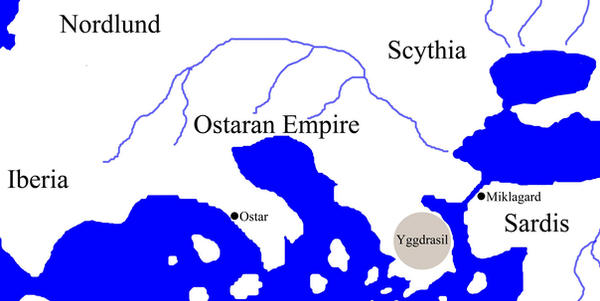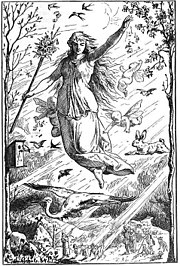
"One shade the more, one ray the less,
Had half impaired the nameless grace
Which waves in every raven tress,
Or softly lightens o'er her face;
Where thoughts serenely sweet express
How pure, how dear their dwelling-place."
-Lord Byron, She Walks in Beauty
The greatest of the lands of Men, sworn in spirit to the goddess Ostara (aka Frigga) and the teachings of the Aesir. The Empire is ruled over by the Emperor (presently Gunner the 8th ) in the city of Ostar. The Empire is not a highly centralized state. Instead, it is divided into hundreds of individual entities governed by kings, earls, godar (cleric-lords) or other rulers, collectively known as princes. There are also some areas ruled directly by the Emperor such as Imperial Free Cities (see below). At no time can the Emperor simply issue decrees and govern autonomously over the Empire.
The Empire is expansionist, seeking to conquer its neighbors and to dominate trade across the waves. Control of the mountainous country from which the World Tree Yggdrasil is of particular interest to the Empire, and the ever seek to control that land. At present the Empire is at peace, though frequent skirmishes along all of her borders are common occurrences.
Religion
 Worship of the Aesir is the primary faith of Ostar, though the Vanir have many followers as well. Worship of the Jotun is illegal and punishable by death. Religious practices in the Empire are highly ritualized and grand affairs, with the great temples in Ostar holding great festivals and parades to the delight of the people. Preparation for Ragnarok is of the utmost concern to the Empire, and particularly the defense of the great tree Yggdrasil.
Worship of the Aesir is the primary faith of Ostar, though the Vanir have many followers as well. Worship of the Jotun is illegal and punishable by death. Religious practices in the Empire are highly ritualized and grand affairs, with the great temples in Ostar holding great festivals and parades to the delight of the people. Preparation for Ragnarok is of the utmost concern to the Empire, and particularly the defense of the great tree Yggdrasil.
The goddess Ostara, Goddess of the Dawn (another name for Frigga), is the patron deity of the Empire. Her symbol, a golden ring (pictured to the left), is the emblem of the Empire itself. The priestesses of Ostara are the most powerful religious group in the Empire, and seen as the spirit of all of its lands and people. Because of this, the dawn and the spring is considered to be the holiest of times and a time of ritual, prayer and celebration.
Paladins dedicated to Ostara are quite numerous and typically remain chaste in dedication to Ostaras beauty. The Valkyrie (see Warrior Societies for details) consider themselves servants of this goddess as well, and can often be found acting as guardians to her priesthood.
The Emperor
 "The abuse of greatness is when it disjoins remorse from power."
"The abuse of greatness is when it disjoins remorse from power."
-Julius Caesar
The seat of the Emperor is gained in a manner similar to a King (see social rank for details) though in the case of the Emperor, he is elected by the council of princes; kings, powerful jarls and powerful godar rather than the freemen. The Emperor is said to be the “Champion of Ostara.” guardian of the goddesses honor. It is traditional that the Emperors wife be the High Priestess of Ostara (see below), though heirs might be produced from concubines.
The High Althing: A powerful court of lords who discuss the great rulings of the Empire. As most times the various and far-flung princes cannot always take direct part in the High Althing, they instead send trusted agents (often their children) to speak for them. Proceedings at this grand Althing otherwise functions the same as the Althing.
Imperial Free Cities: A free imperial city is a city formally ruled by the emperor only, as opposed to the majority of cities in the Empire, which belong to a territory and so were governed by one of the many princes of the Empire, such as earls or prince-godar. Free cities also have independent representation in the High Althing of the Ostaran Empire.
Imperial Free Cities are effectively trade cities, allowing for the gathering and distribution of items within the Empire. Within their walls, the cities are controlled by freemen in direct service to the Emperor himself with even Nobles being secondary to the commands of these freemen elect.
The Unnumbered (Society)
 “Then storm they, nothing yielded,
“Then storm they, nothing yielded,
Two autumn-billows like!
And oft, with steel round shielded,
Their jarring breasts fierce strike.
“All like two bears they wrestle,
On hills of snow; and draw
And strain, each like an eagle
On the angry sea at war.
The root-fast rock resisted
Full hardly them between
And green iron oaks down-twisted
With lesser pulls have been.
“From each broad brow sweat rushes;
Their bosoms coldly heave;
And stones and mounds and bushes Dints hundred-fold receive.”
-Tegnér, Frithiof Saga
The elite backbone of the Imperial army, and the greatest fighters in the world of men. In times of war, the Unnumbered represent the arm of the Emperor, commanding the mustered troops and the standing Imperial army. Unnumbered can be recognized due to their insignia tattoo of the Ring of Ostara on their upper left arm, as well as their air of command.
Humans are the only race to be found amongst the unnumbered, though a small number of Asgardian (Celestial) humans can be found as well. Though fighters are the most numerous in the Unnumbered, Paladins and multiclass Fighter/Clerics (Aesir) are highly valued.
Requirements: Human Paladin or Fighter of Lawful alignment. Membership requires that the character act honorably in all dealings, be brave and bold and think always of the success of the forces under his command. Unnumbered are often put in command of lesser troops, and must lead from the front.
Benefits: Members are considered amongst the greatest fighters in the world, and are respected because of it. All members may use the Profession (soldier) skill untrained as appropriate. Unnumbered always have room and board at Imperial fortresses and camps, albeit this is usually the simple fare and lodgings of the common soldiers.
Priestesses of Ostara (Society)
 "The fields are chill, the sparse rain has stopped; The colours of Spring teem on every side. With leaping fish the blue pond is full; With singing thrushes the green boughs droop. The flowers of the field have dabbled their powdered cheeks; The mountain grasses are bent level at the waist. By the bamboo stream the last fragment of cloud Blown by the wind slowly scatters away."
"The fields are chill, the sparse rain has stopped; The colours of Spring teem on every side. With leaping fish the blue pond is full; With singing thrushes the green boughs droop. The flowers of the field have dabbled their powdered cheeks; The mountain grasses are bent level at the waist. By the bamboo stream the last fragment of cloud Blown by the wind slowly scatters away."
-Clearing at Dawn, Li Po
The priestesses of Ostara serve that goddess exclusively to all other gods, seeing her as their ideal and ultimate patron. Other members of the Aesir are acknowledged in their roles, but it is Ostara who reigns in their hearts. Priestesses are always strong and outspoken women, with a clear understanding of politics and the realities of war.
Humans and Half Elves can be found amongst the priestesses, though only humans may achieve the role of High Priestess. The only multiclass found amongst the Priestesses is the Hierophant prestige class. Clerics of Ostara must choose from the Sun, Law, or Magic domains.
Requirements: Female, Lawful Cleric or the Aesir. The primary duty of priestesses of Ostara is overseeing weddings, planting and animal husbandry. They must also minister to the sick, and often serve as oracles for their communities. If they marry, they are expected to watch over their home and set a good example for other wives by not letting their husbands stray too far out of the marital fold. If the husband of a priestess of Ostara practices the common Nine Worlds custom of taking a second wife, the priestess must divorce him immediately.
Benefits: Priestesses of Ostara have great prestige in Ostara, being seen as above reproach and vestiges of honor and strength. All married members gain an Amulet of Health (+2) as their holy symbol, bearing the seal of Ostara, a ring, not unlike a wedding ring.
Other Nations and Peoples
Nordlund: The people of this wild land are proud and poorly made for the life of Empire. Still, in-between wars and raiding between the empire and their own lords, the people of this region trade with Ostar and beyond.
Iberia: The lands of Iberia are under the protection of the Vanir and the Elves and are considered off limits to Ostar. Still, border raids and small wars happen frequently. As this merely adds to the number of chosen slain for Valhalla and Freya’s hall of Sessrumnir, it is not an issue of Imperial concern.
Miklagard: Once an Imperial Free City, now a separate city-state of its own, ruled by Noble/merchants. The Empire would greatly love to gain control of this city and its enviable trade routes once more, but has been foiled many times by Miklagaards wily rulers and a vast mercenary army (with a great number of Trolde).
Permia: The lands of Permia are part legend to the Empire. Delegates from that land occasionally come to visit and trade with the Empire, bringing strange magics and stranger furs.
Scythia: The city-states of Scythia have refused to acknowledge the Empire as anything other than a frequent enemy. Scythian slavers and raiders are a constant threat along the northern border.
Sardis: The far lands of Sardis are greatly desired as a trade route to the East and South and in the past were under the control of the Empire. Now the powerful city-state of Miklagard controls the trade routes through that land and has powerful alliances with many of the tribes of the Sardis.
Dwarves: Dwarf craftsmanship is much desired by the Empire, but the threat of these beings does not go unconsidered. Officially, the Modsognor Dwarven people are at peace with the Empire (though slave-taking still occurs), while the Durin race is seen as hopelessly malevolent. Few in the Empire can tell the difference between these peoples, either in dress or behavior.
Elves: Elves are a puzzle for the Empire. While they are beautiful, courteous and powerful they are also haughty, amoral and frightening. Officially, the Empire is allied with the elves, though this is a pact that few Imperials wish to call upon for fear of the result.
Trolde: Trolde bandits are a frequent headache for the Empire, as the creatures frequently come out of the forests to steal people, livestock and grain. And so Trolde are not much liked in the Empire, typically seen as monsters, and having no more legal rights than a Thrall. Some Trolde working and mercenaries are to be found in the Empire, and are granted some legal rights.
Notes: I decided a civilized nation was in order for this setting. As this world is more to the tastes of a Norse way of things, I decided that a more "Saxon" sort of Empire was in order.



No comments:
Post a Comment